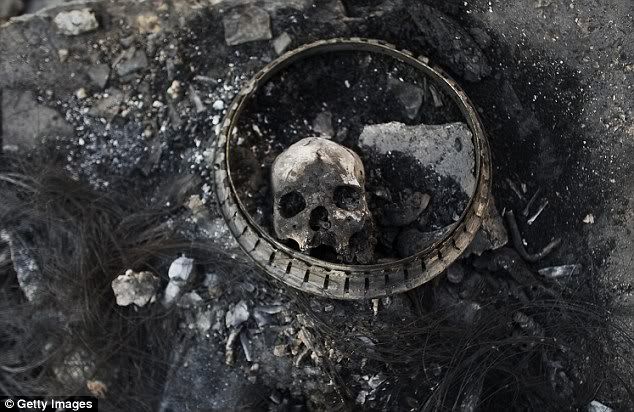
People walk through the former Petionville golf course which has been turned into a makeshift camp
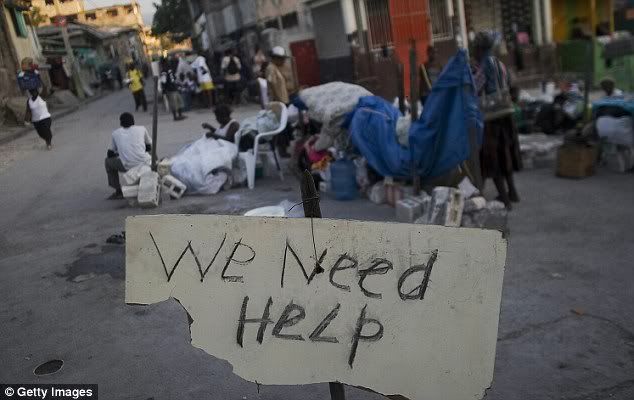
A sign written by displaced Haitians entreating for help is seen January 27, 2010 in Port-au-Prince
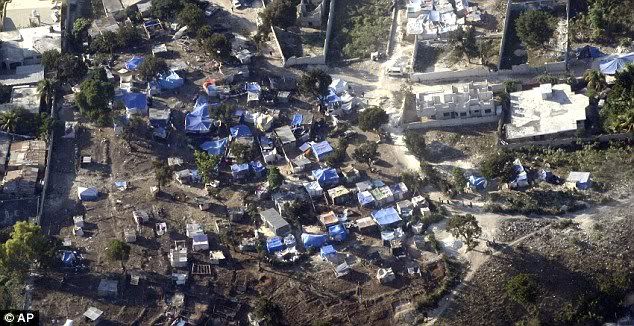
An aerial view shows one of the many tent cities seen in Port-au-Prince. Aid agencies have had great trouble reaching many of the homeless
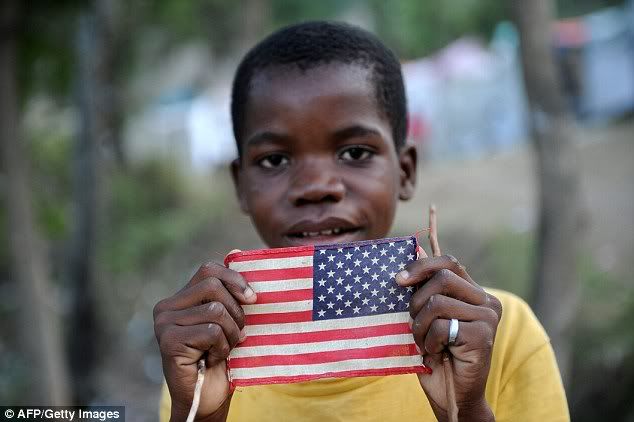
A holds up a US flag at the former Petionville golf course which has been turned into a makeshift camp in Port-au-Prince
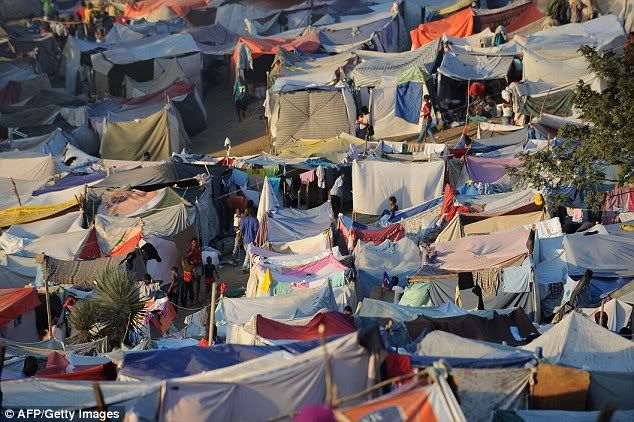
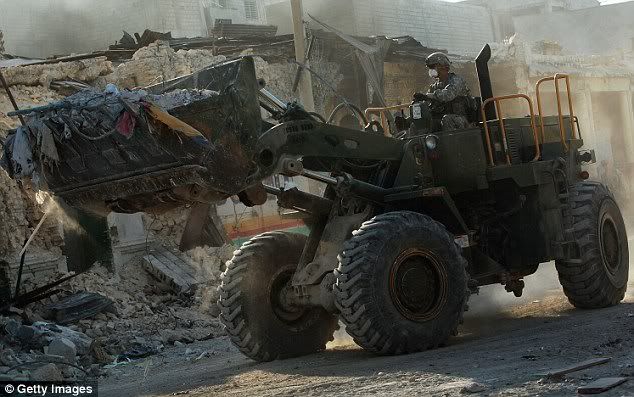
A U.S. Army soldier operated earth moving machinery as he helps clear central Port-au-Prince. According to reports approximately 250,000 structures have at least partially collapsed from the earthquake
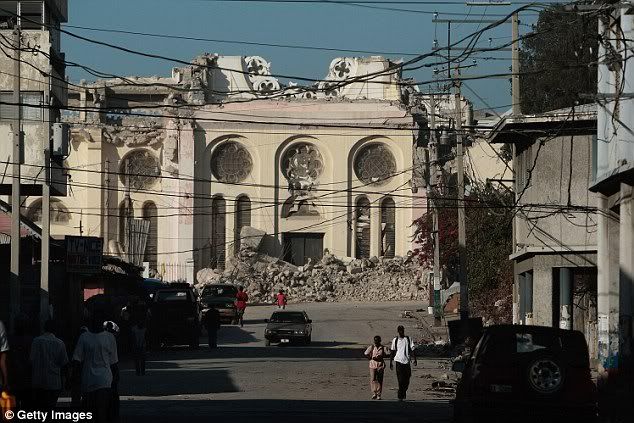
The earthquake-damaged remains of the National Cathedral are seen in central Port-au-Prince
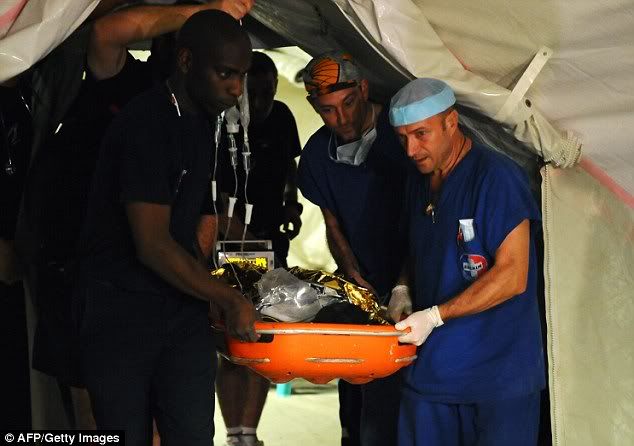
French medics carry a girl who was found alive in the rubble at the French hospital in Port-au-Prince
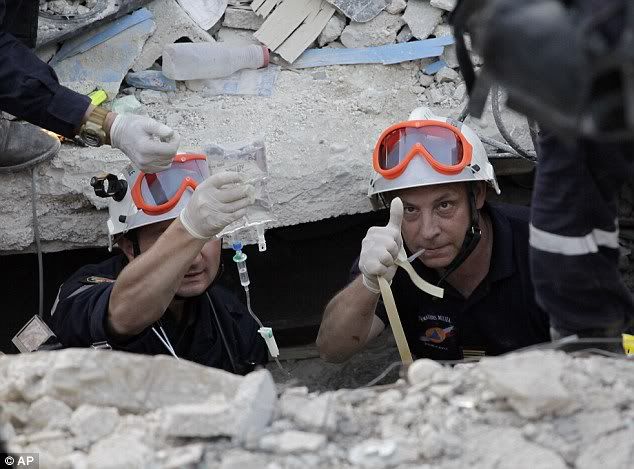
Saved: A French search and rescue team gestures after locating Darlene from the rubble. The official search for survivors was called off days ago
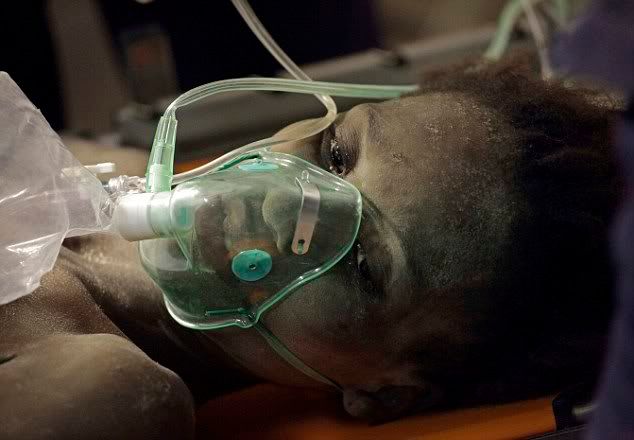
Survivor: Darlene Etienne, 17, was pulled alive from the rubble of a house in Port-au-Prince 15 days after the devastating earthquake
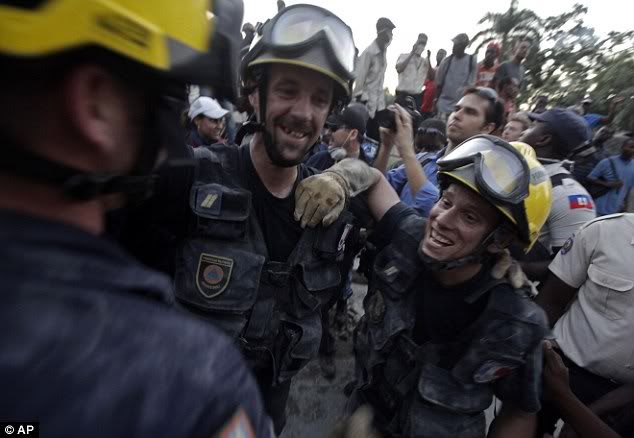
Exhausted but jubilant: Members of the French search and rescue team react after pulling Darlene from a building alive
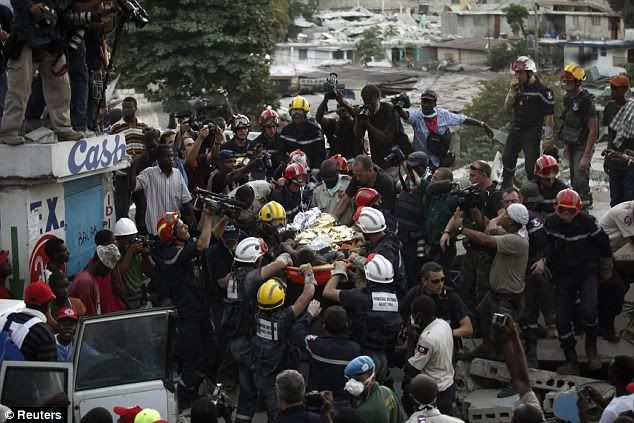
French Ambassador Didier le Bret praised the rescue team, which has kept looking for survivors for days after the Haitian government officially called off the search
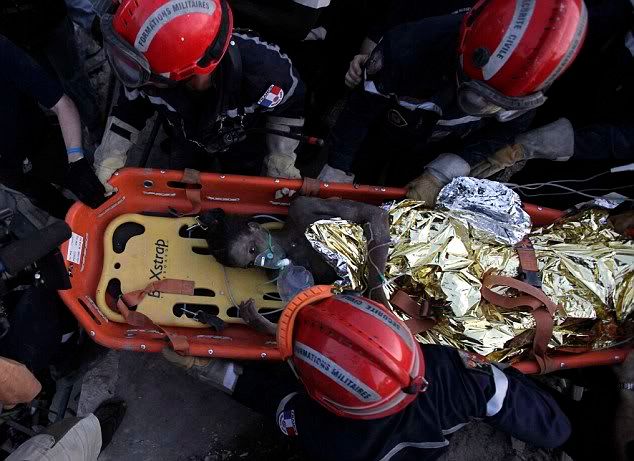
Safe at last: French Search and Rescue workers pull out Darlene Etienne from a building in Port-au-Prince
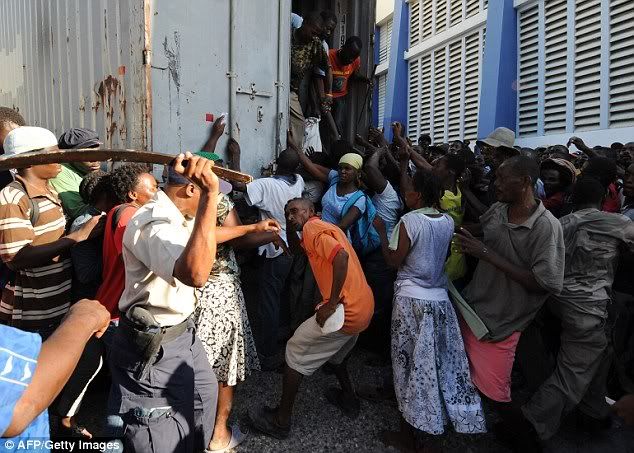
A policeman trys to control a crowd of Haitians at an aid distribution point in Port-au-Prince
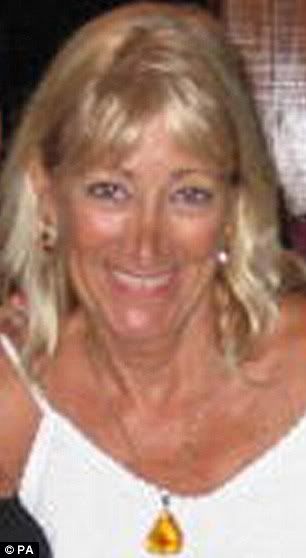
Dead: Ann Barnes, 59, was on the second floor of a building when the powerful earthquake struck
A teenage girl was pulled alive from the rubble in Port-au-Prince, 15 days after the Haitian earthquake.
Darlene Etienne, 17, was just moments from death when she was save by French rescue workers from of a home near the destroyed St. Gerard University.
The teenagers was rushed to a French military field hospital and then to the French military hospital ship Sirroco, suffering from severe dehydration and a broken left leg.
She's alive!' said paramedic Paul Francois-Valette, who accompanied her into the hospital.
Authorities say it is rare for anyone to survive more than 72 hours without water, little alone more than two weeks.
But Etienne may have had some access to water from a bathroom of the collapsed home, and rescuers said she mumbled something about having a little Coca-Cola with her in the rubble.
Her family said Etienne had just started studying when the disaster struck, trapping dozens of students and staff in the rubble of school buildings, hostels and nearby homes.
'We thought she was dead,' her cousin, Jocelyn A. St. Jules, said in a telephone call.
Then - half a month after the earthquake - neighbours on Wednesday heard a voice weakly calling from the rubble of a private home down the road from the collapsed university.
They called authorities, who brought in the French civil response team.
Rescuer Claude Fuilla then walked along the dangerously crumbled roof, heard her voice and saw a little bit of dust-covered black hair in the rubble. Clearing away some debris, he managed to reach the young woman and see she was alive - barely.
'She couldn't really talk to us or say how long she'd been there but I think she'd been there since the earthquake. I don't think she could have survived even a few more hours,' Fuilla said.
Digging out a hole big enough to give her oxygen and water, they found she had a very weak pulse.
Within 45 minutes they managed to remove her, covered in dust.
Fuilla said she was rescued from what appeared to be the porch area of the house, but a neighbour said he believed it was the shower room, where she might have had access to water.
'It's exceptional. She spoke to us in a very little voice, she was extremely weak,' Fuilla said.
'Before we stabilised her she was extremely dehydrated and weak she had a very low blood pressure.'
Another rescuer, French Lt. Col. Christophe Renou, said he had no idea how she had managed to cling to life for so long: 'Definitely she's been here for 15 days. She wasn't hurt but she was very, very weak.'
Renou said his team would probably return today with radar equipment to look for any other possible survivors.
French Ambassador Didier le Bret praised the persistence of the French rescue team, which has kept looking for survivors for days after the Haitian government officially called off the search.
'They are so stubborn because they should not have been working anymore because, officially, the rescue phase is over.
'But they felt that some lives still are to be saved, so we did not say that they should leave the country,' he said.
'To be honest we thought that the last miracle we had a couple of days ago ... would be the last miracle because the chances are so very, very slight.
'But it seems that beyond the miracle, there was another miracle.'
The last previous confirmed rescue of someone trapped by the initial quake occurred Saturday, 11 days later, when French rescuers extricated a man from the ruins of a hotel grocery store.
A man pulled from the rubble of a shop on Tuesday and treated by the U.S. military for severe dehydration and a broken leg said he had been trapped during an aftershock.
At least 135 people have been unearthed by rescue teams since the quake on January 12.
Yesterday the Foreign Office confirmed that a second Briton had been killed in the disaster.
Ann Barnes, 59, originally from Leigh-on-Sea, Essex, is believed to have been on the second floor of a building when the 7.0 magnitude tremor struck.
United Nations worker Frederick Wooldridge, 41, from Kent, was the first Briton to be confirmed dead after perishing with dozens of his colleagues.
Ms Barnes had no children and was not married but had a French partner on the island.
She was a personal assistant to the UN police commissioner and had worked for the UN for more than 20 years.
Her cousin, Christine Hart, 69, from Hornchurch, Essex, said she had refused to give up hope.
'The United Nations confirmed that the body is Ann, it is the news we feared most.'
She added: 'There is nothing I can say, her sister wants to be quiet about things too.'
Ms Barnes was thought to be in the second floor of the United Nations building when it collapsed.
Her partner Bruno has been clawing through the rubble with his bare hands since she vanished.
Mrs Hart added: 'He hasn't left the site. He went home to see what had happened to their house. The house was gone, but he got their dog.'Meanwhile, food from the world's aid agencies still isn't getting to enough hungry Haitians.
The newly homeless of the rubble-strewn Bizoton slum say they haven't gotten food, water or help with shelter in the two weeks since the earthquake.
'If it rains now, that's it,' Wilson St. Ellis, 50, a father of eight, said yesterday amid plastic sheets stretched here and there as flimsy shields against the elements.
Where donated rice, beans or ready-to-eat meals are being distributed, crowds quickly become unruly, with young men pushing ahead and grabbing food bags from women and the weak.
UN peacekeepers fire pepper spray and Haitian police swing sticks to restore control.
'These people are just hungry,' UN spokesman Vincenzo Pugliese said of the thousands thronging food distribution points, where he said UN peacekeepers were reinforcing security.
Food remains scarce for many of the neediest survivors despite the efforts of the United Nations, the U.S. military and dozens of international aid groups.
Relief experts say the scale of this disaster and Haiti's poor infrastructure are presenting unprecedented challenges, but Haitian leaders complain coordination has been poor.
'Many mistakes have to be rectified in order to bring help to the people who need it,' President Rene Preval complained to reporters.
In a bid to improve food distribution, representatives of the UN, the US, the Haitian government and private aid groups met on Wednesday.
Afterwards Donal Reilly of Catholic Relief Services said they decided to divide Port-au-Prince into zones, designating a major aid agency to be responsible for delivering UN food to each sector.
The UN World Food Program (WFP) says it has reached 450,000 people, but it urgently appealed to governments for more cash for Haiti supplies - £500 million to feed 2 million people through until December - more than quadruple the £100 million already pledged.
The food agency says rising tensions and security incidents - 'including people rushing distribution points for food' - have hampered deliveries.
But since the massive relief effort's first days, other problems have also delayed aid - blocked and congested roads, shortages of trucks, a crippled seaport and an overloaded Port-au-Prince airport.
'The unblocking of the logistical bottlenecks is an absolute priority,' the European Commission said, describing a seven-day backlog of 1,000 relief flights seeking permission to land at the single-runway airport.
The senior US officer in Haiti said Haitian families simply cannot rely on any particular location for rations.
Food is 'flooding' into the city, Lt. Gen. Ken Keen told reporters, 'but it's being delivered pretty much in terms of where we can get to and where we can distribute it,' not always in locations that are 'sustained every day.'
At some regular distribution points, such as near the Champs de Mars, the central plaza where thousands of homeless are living, daily food handouts have drawn crowds of frantic people. Desperation boiled over earlier this week and Uruguayan peacekeepers retreated as young men rushed forward to grab US-donated bags of beans and rice.
A pregnant woman collapsed and was trampled.
Elsewhere as well, the strong have preyed on the weak, prying donated food from their arms.
'These things should be done is a systematic way, not a random way,' said Dr. Eddy Delalue, who runs a Haitian relief group, Operation Hope.
'It's survival of the fittest: The strongest guy gets it.'
At one squatter settlement Julia Jean-Francois, 25, clutching a grocery bag filled with small packets of donated water, told of her encounter with food robbers.
'I lost all the rice, beans and oil that were distributed last week. A group of young men shoved me and grabbed the bags and ran away,' said Jean-Francois, whose mother was killed in the quake.
An hour later, she said, one of the men returned and offered to sell her the same food for the equivalent of £12.
She refused, relying instead on a communal kitchen she formed with homeless neighbours.
She said Haitian police patrolling nearby did nothing while people were robbed. 'We complained, and they got into their truck and left,' she said.
As she spoke, a gang of youths pushed into a queue of people waiting for water, shoving an elderly woman, who screamed and swung her bucket at their heads.
Port-au-Prince street vendors can be seen openly selling US-donated rice by the cupful from bags marked 'not for resale.'
Fears of official corruption surrounding the food aid also are surfacing.
Paul Coroleuski of the US-based Convoy of Hope, which has distributed aid in Haiti for three years, said he has more than 100 tons of food in a Port-au-Prince warehouse ready to hand out, but it has been delayed for days by Haitian officials who say they will take over distribution.
Private agencies like his worry that Haitian officials 'will do what they always have done, which is the government takes care of the government and the people are secondary,' he said.
Haitian officials denied the government plans to take over food distribution from private agencies.
Coroleuski's frustration and distrust of the government is echoed in Port-au-Prince's streets.
'If they turn it over to the Haitian government, they would take it all for themselves,' said Muller Bellegarde, 30, as he waited for food in the unrelenting tropical sun.
Haitians remember that when the government took charge of delivering international aid to the city of Gonaives after deadly hurricane floods in 2008, much of it ended up sold on the black market.






0 comments:
Post a Comment